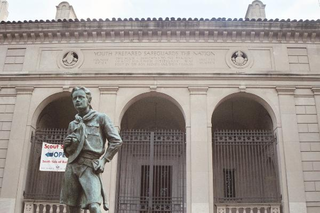
Scouting, also known as the Scout Movement, is a worldwide youth social movement employing the Scout method, a program of informal education with an emphasis on practical outdoor activities, including camping, woodcraft, aquatics, hiking, backpacking, and sports. Another widely recognized movement characteristic is the Scout uniform, by intent hiding all differences of social standing in a country and encouraging equality, with neckerchief and campaign hat or comparable headwear. Distinctive uniform insignia include the fleur-de-lis and the trefoil, as well as merit badges and other patches.

Ernest Thompson Seton was a Canadian-American author, wildlife artist, founder of the Woodcraft Indians in 1902, and one of the founding pioneers of the Boy Scouts of America (BSA) in 1910.

Woodcraft Folk is a UK-based educational movement for children and young people. Founded in 1925 and grown by volunteers, it has been a registered charity since 1965 and a registered company limited by guarantee since 2012. The constitutional object of this youth organisation is "to educate and empower young people to be able to participate actively in society, improving their lives and others' through active citizenship."
The history of youth work goes back to the birth of the Industrial Revolution in the 18th century, which was the first time that young men left their own homes and cottage industries to migrate to the big towns. The result of this migration was an emergent youth culture in urban areas, which was responded to by the efforts of local people.

The Kindred of the Kibbo Kift was a camping, hiking and handicraft group with ambitions to bring world peace. It was the first of three movements in England associated with the charismatic artist and writer John Hargrave (1894–1982). The Kindred was founded in 1920. Some members continued into Hargrave's Green Shirt Movement for Social Credit, which was established in 1931–32, and which became in 1935 the Social Credit Party of Great Britain and Northern Ireland. This was wound up in 1951.
Woodcraft is a recreational/educational program devised by Ernest Thompson Seton in 1902, for young people based on camping, outdoor skills, and woodcrafts. Thompson Seton's Woodcraft ideas were incorporated into the early Scout movement, but also in many other organisations in many countries.
Woodcraft League of America, originally called the Woodcraft Indians and League of Woodcraft Indians, is a youth program, established by Ernest Thompson Seton in 1901. Despite the name, the program was created for non-Indian children. At first the group was for boys only, but later it would also include girls. Seton instructed the children in his town in Connecticut in outdoor "Woodcraft" – knowledge and skills of life in the woods – and based much of the group's terminology and structure on the misconceptions about Native Americans that were common in that era. The program spread internationally to become the Woodcraft Movement and many of these programs still exist. Seton's Woodcraft scheme also had a strong influence on later youth programs and organizations, particularly, the Scout Movement.
Scoutcraft is a term used to cover a variety of woodcraft knowledge and skills required by people seeking to venture into wild country and sustain themselves independently. The term has been adopted by Scouting organizations to reflect skills and knowledge which are felt to be a core part of the various programs, alongside community and spirituality. Skills commonly included are camping, cooking, first aid, wilderness survival, orienteering and pioneering.
Lone Scouts are members of the Scout movement who undertake scout activities on their own or by distance communication, usually because they live in isolated areas or otherwise do not participate in scout activities with other scouts. A Lone Scout may have an adult Scout leader or counselor who may instruct and supervise them. They can follow the same program as other Scouts and may advance in the same way as all other Scouts.

Godshill is a village and civil parish and in New Forest National Park in Hampshire, England. It is about 1+1⁄2 miles (2.4 km) east of the town of Fordingbridge and 10 miles (16 km) south of the city of Salisbury.
Brian Morris is emeritus professor of anthropology at Goldsmiths College at the University of London. He is a specialist on folk taxonomy, ethnobotany and ethnozoology, and on religion and symbolism. He has carried out fieldwork among South Asian hunter-gatherers and in Malawi. Groups that he has studied include the Ojibwa.

Scouting in the United States is dominated by the 1.2 million-member Boy Scouts of America and the Girl Scouts of the USA and other associations that are recognized by one of the international Scouting organizations. There are also a few smaller, independent groups that are considered to be "Scout-like" or otherwise Scouting related.
Non-aligned Scouting organizations is a term used by the World Organization of the Scout Movement (WOSM), World Association of Girl Guides and Girl Scouts (WAGGGS) and their member national organizations to refer to Scouting organizations that are not affiliated with them. See List of non-aligned Scouting organizations.
The Order of Woodcraft Chivalry is a scouting-like movement operating in the United Kingdom, which was founded in 1916 by Ernest Westlake. It was inspired by Ernest Thompson Seton's Woodcraft Indians, and Seton was its honorary Grand Chieftain. Whilst largely being contemporary to Baden-Powell's Scouting movement, it differed from it in that it does not have the perceived military overtones of Scouting, instead focusing on the virtues of kindness, fellowship and woodcraft. The Order was small compared to Scouts, having only 1,200 members by 1926. By the 1950s it had ceased to have a major public presence. It still exists (2016) as a semi-formal network of personal friends with historic family links to the original formal organisation, with little interest in publicity and few surviving overt connections with the Woodcraft Folk or the Forest School Camps.
YMCA Camp Belknap is an all-boys summer resident camp in Tuftonboro, New Hampshire, on the shores of Lake Winnipesaukee. Founded in 1903, on Winnipesaukee's Timber Island, in the shadow of Belknap Mountain, its likely namesake. Relocated to Tuftonboro in 1907, this boys' camp was owned and operated by the New Hampshire YMCA until the demise of the state Y in 1996. It is now an independent non-profit affiliated with the national Y. Belknap celebrated its 100th year in operation in 2003, making it one of the oldest continuously operating camps in the United States.

The terms woodcraft and woodlore denote skills and experience in matters relating to living and thriving in the woods—such as hunting, fishing, and camping—whether on a short- or long-term basis. Traditionally, woodcraft pertains to subsistence lifestyles, with implications of hunting-gathering. In more recent times, and in developed countries, it relates more to either outdoor recreationalism or survivalism.

Braziers Park is a Grade II* country house and estate on the edge of Ipsden - a small village near Wallingford, Oxfordshire, England - housing a secular intentional community and the School of Integrative Social Research. It has also been used as a film location for large- and small-budget films.

Scouting for Boys: A handbook for instruction in good citizenship is a book on Boy Scout training, published in various editions since 1908. Early editions were written and illustrated by Robert Baden-Powell with later editions being extensively rewritten by others. The book was originally a manual for self-instruction in observation, tracking and woodcraft skills as well as self-discipline and self-improvement, about the British Empire and duty as citizens with an eclectic mix of anecdotes and unabashed personal observations and recollections. It is pervaded by a degree of moral proselytizing and references to the author's own exploits. It is based on his boyhood experiences, his experience with the Mafeking Cadet Corps during the Second Boer War at the siege of Mafeking, and on his experimental camp on Brownsea Island, England.

Sandy Balls is 120 acres (0.49 km2) of woods and parkland near the New Forest in Hampshire, England. Located between the village of Godshill and the town of Fordingbridge, it is bounded on the western edge by the River Avon. Now run as a holiday centre, Sandy Balls is owned by Away Resorts.
The Red Lodge was a fraternal organization that traced its lineage back to 1912 with the creation of the Red Lodge or Medicine Lodge by Ernest Thompson Seton within the Woodcraft Movement. They describe themselves as a Brotherhood of men who have an appreciation for the outdoors, who are interested in the mystic side of Woodcraft and who have learned that true power comes from self-control.
John Field, "Alternative Living, Alternative Learning: the Grith Fyrd Movement in England in the 1930s", in Anthony Cooke and Ann MacSween (editors) The Rise and Fall of Adult Education Institutions and Social Movements, Peter Lang, 2000.









